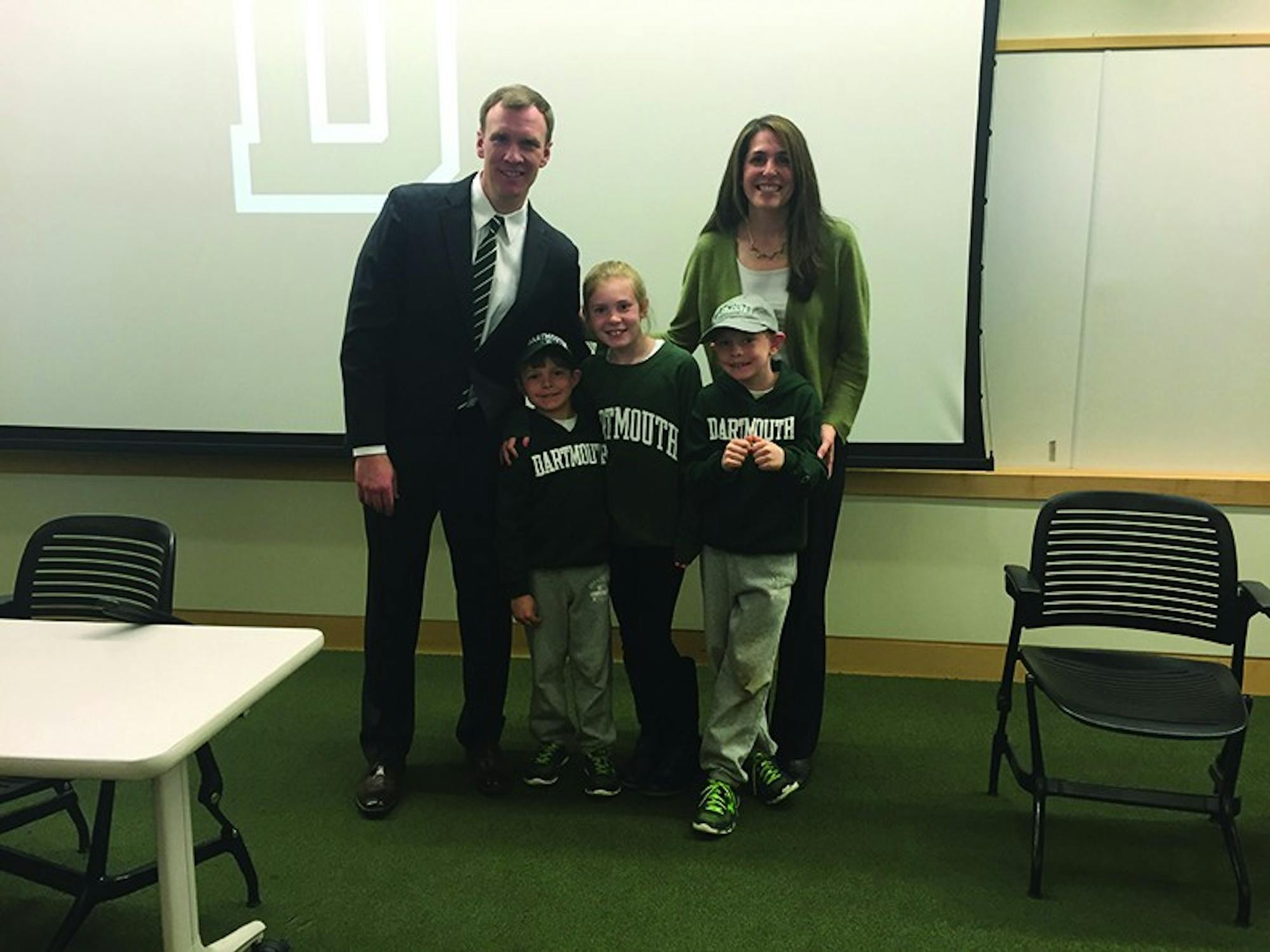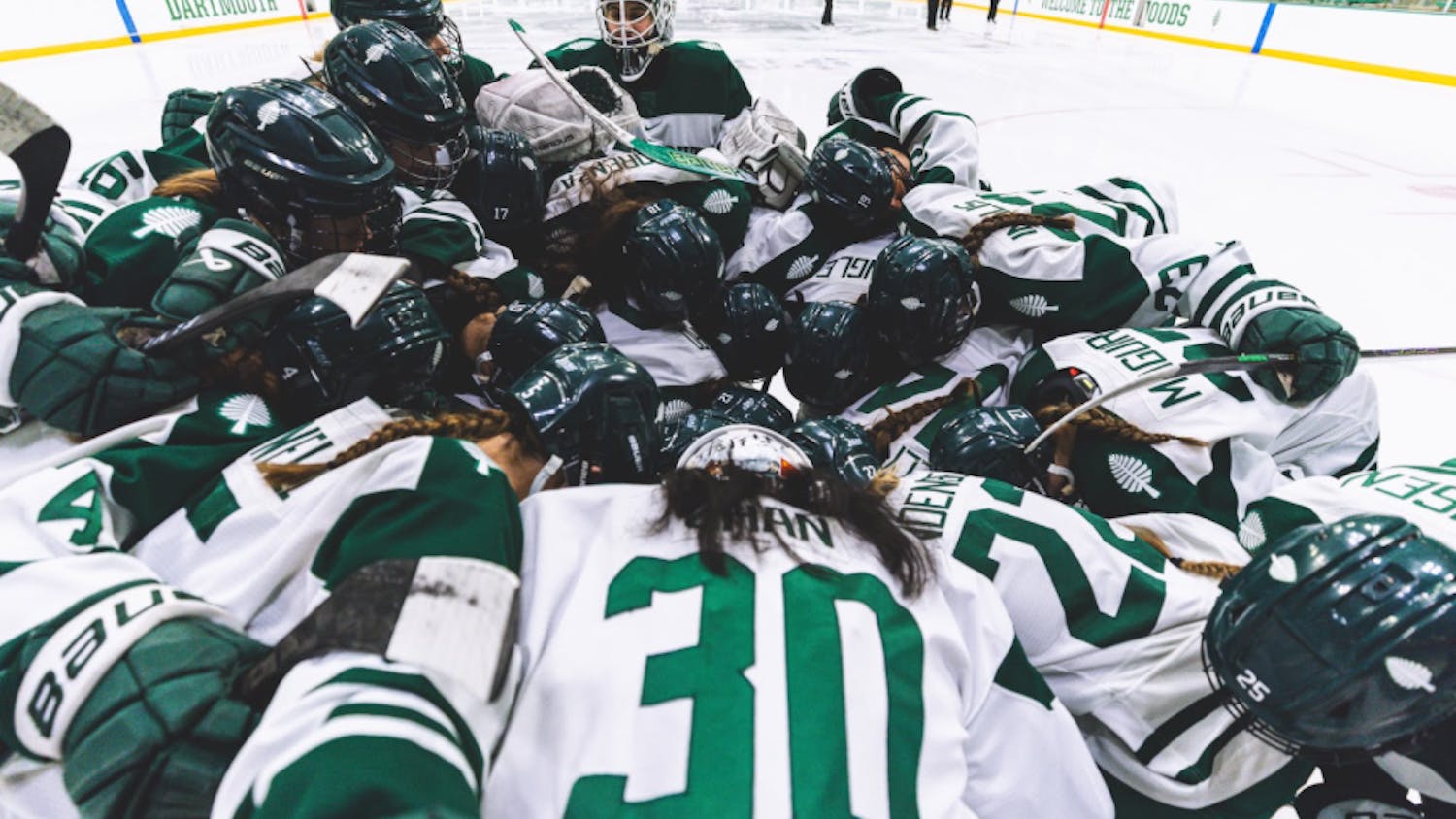A skeptical laugh broke the silence in a press conference on Wednesday, challenging newly hired men’s basketball coach David McLaughlin’s hopes of having his new staff hired in just two short weeks. But McLaughlin, standing tall and calm at the front of the room, did not miss a beat, expounding upon his plan to turn the men’s basketball team into a competitive Ivy League program. The staff, McLaughlin continued, will all need to “breathe the same air” in order to pull good recruits and make progress in Hanover.
After last season’s 10-18 overall, 4-10 Ivy League finish, McLaughlin comes to the Big Green with several challenges. The team is graduating important senior players like Connor Boehm ’16, one of only two players to start all 28 games last season and a player who contributed 312 points to the Big Green in his final campaign. The team has talent in two underclassmen — Evan Boudreaux ’19 and Miles Wright ’18 — both of whom earned Ivy League Rookie of the Year honors as freshmen but neither of whom enjoyed an overall team record over .500. The team also has untapped talent in current players still seeking to reach their full potentials. In a previous article, athletic director Harry Sheehy said that recruiting and player development both were not up to snuff, allowing Dartmouth only to climb out of the rut left in the 2009-2010 season when then head coach Terry Dunn lead the Big Green to a 5-23 overall, 1-13 Ivy League record. But the Big Green wanted more. Enter David McLaughlin.
McLaughlin comes to the Big Green immediately after spending three seasons as the associate head coach at Northeastern University with a total record of 52-48. In the 2014-2015 season, the Huskies went 23-12 to share the championship in the Colonial Athletic Association, garnering a bid to the NCAA tournament for the first time in 24 years. Before coaching at Northeastern, McLaughlin earned his chops at the helm of Division II Stonehill College. McLaughlin ended his tenure in the Northeast-10 Conference with an overall record of 189-99, lifting a team that had gone 11-45 in the two seasons before he arrived. But McLaughlin’s achievements, Sheehy said at the press conference, were only one factor among many in the competitive coach selection. Sheehy said the school was looking for a coach not only with unbelievable passion but who also was a “great recruiter, teacher and first-class person with high integrity that is also fun to work with.”
The press conference, which was held at 11 a.m. last Wednesday, served as McLaughlin’s first introduction into the Dartmouth community. In attendance were other Dartmouth coaches, McLaughlin’s mentor and coach Dick Whitmore, administrative officials and members of the athletic department, media members and McLaughlin’s family. McLaughlin spoke at length about Whitmore’s impact on his life, naming Whitmore as the reason he became a coach in the first place. He thanked others, including the athletic director at Stonehill, Paula Smith; his wife, who he said helped him stuff 300 envelopes searching for a coaching job back in 1997, only one of which resulted in a response; the head coach of his program; and the Dartmouth players. His own 6-year-old son, Colin, charmed the crowd by announcing much to the audience’s surprise that his favorite sport was baseball.
Coaching Dartmouth basketball will likely be the biggest challenge McLaughlin has faced since he became a coach out of college. He faces a program that has struggled to show signs of true success in more than a decade — a program that lead to the departure of one of its star players, Alex Mitola ’16, at the end of his junior year. A program that remained stagnant as other Ivy League programs’ success increased dramatically and a program that might lack the personnel to make his dreams happen. But if the courtside doubters and backseat laughers have doubts about the future, McLaughlin appears to be talking over them day in and day out, and that kind of belief and ambition could be what the program needs to reach the next level.
“We are going to be a work team,” McLaughlin said. “We’ll work hard, smart and together on offense…Beyond that we’re going to work on execution. We want to execute at the highest degree offensively. The ball is made to move around the court, and we’re going to do that.”
In addition to hoping to “teach guys to play defense,” McLaughlin pointed several times to his philosophy of work, telling the players in attendance that they would be running more this summer than they ever have in their lives. The players the team has now, McLaughlin said, are his “top recruits.”
He points, intentionally or inadvertently, to a dark part of history that mired the men’s basketball program after former head coach Paul Cormier’s second arrival at Dartmouth. Cormier brought on Tyler Melville ’14 as his first recruit, later than the other recruits of the class of 2014 who were picked up by the previous coach. By Melville’s senior season, he was the only member of the class of 2014 still on the team. Several players quit while under Cormier’s tutelage. When a new coach comes into a program, whispers circulate about how that coach will treat the existing roster — the one that coach didn’t recruit, didn’t pick and might not see anything in. An anonymous former player in a previous article pointed to Cormier’s need for more positivity around the team, raising questions about what a coach brings to the team besides offensive and defensive strategy and how that can ultimately affect the team’s performance.
“With recruitment it’s recruiting the guys that are here in terms of building trust with them,” McLaughlin said. “I think that’s how you activate that talent. They have to want to allow you to push them. They have to trust you when you give them commands or direction. Our goal is to make great trust levels with them with our entire staff. If we can obtain that by the end of the year, get on the court with them a little bit, I think that’s a huge step heading into the summer.”
A great coach, of course, will need both the cultural aptitude and the game sense. In terms of game sense, histories at Stonehill and Northeastern point to a decent amount of knowledge. McLaughlin is an award-winning coach. He was named the National Association of Basketball Coaches Regional Coach of the Year in 2006 and 2011 as well as the Northeast 10 Conference Coach of the Year in 2006 and 2010. With five coaches flown into Hanover by the athletic department to interview for the job, options were abound for coaches with winning records. What the department needs isn’t a coach who can generate wins — it’s a coach who can generate wins here. And the one who can convince players to come here to ultimately make winning an expectation instead of an exception. And maybe McLaughlin is just the guy to make that happen.
“I think as a team we’re really excited to get some new energy,” Boudreaux said. “I think the things he brings to the table in terms of developing players is something that we are really excited for. He’s going to make players better, not just the guys who are starting but the whole team.”
The truth of the matter is that nobody knows what is going to happen with the team. That certainly won’t stop people from saying they knew he would win/lose/do okay/maintain/crash and burn/dominate the moment they heard him speak at his first press conference in Hanover. And a press conference is a moment for a coach to be idealistic without fear of consequences, to be humble while others tout his strengths. But there’s no reason, really, to doubt that he could be the guy — until he shows us that he is or he isn’t.




